Background Checks
What Type of Background Checks Do Hospitals Do? Details
Operating with precision, hospitals implement thorough background checks for employees, ensuring safety and transparency in their workforce.

Hospitals conduct thorough background checks for all employees to uphold safety standards. These checks include criminal history screenings to flag any concerning offenses like violence or drugs. Mandatory drug screenings help maintain a safe workplace and prevent substance abuse. Educational and professional qualifications are verified to guarantee transparency and credibility. Additional measures such as national sex offender searches and identity verification further enhance safety protocols. These exhaustive checks aim to create a secure environment for patients and staff.
Key Takeaways
- Hospitals conduct criminal background checks for violent felonies, sex offenses, drug offenses, and financial crimes.
- Mandatory drug screenings ensure a drug-free workplace and address substance abuse promptly.
- Education and professional verification confirm qualifications, certifications, and license validity for credibility.
- Additional measures include national sex offender searches, identity verification, and federal exclusion searches.
- The aim is to maintain a safe environment, prevent harmful behavior, and ensure regulatory compliance.
Criminal Background Checks
Hospitals prioritize conducting criminal background checks on potential employees to guarantee a safe and secure environment for patients and staff. These checks aim to uncover any concerning criminal records that may pose a risk to patient safety or compromise the integrity of the healthcare setting.
By identifying red flags such as violent felonies, sex offenses, drug offenses, or financial crimes, hospitals can make informed decisions when hiring new staff members. The goal of these criminal background checks is to make sure that individuals with a history of harmful behavior or illegal activities aren't placed in positions where they could potentially harm patients or violate their trust.
Drug Screening Process

Hospitals mandate drug screening to uphold safety standards and prevent substance abuse risks among staff. The process involves specific requirements, detailed testing procedures, and a clear policy on handling positive results.
Drug Screening Requirements
Drug screening is a vital step in the background check process for healthcare employees in hospitals. Hospitals conduct drug screening to confirm compliance with safety protocols, prevent theft, abuse, and drug-related risks, ensuring a safe work environment and promoting sound decision-making among staff. This process is fundamental in verifying that healthcare employees are capable of handling medications responsibly. By incorporating drug screening into their standard due diligence procedures, hospitals enhance security and trust in their hiring process.
To provide a clearer picture, here is a breakdown of drug screening requirements in hospital background checks:
| Drug Screening Requirements | Details | Importance |
|---|---|---|
| Mandatory for all employees | Confirms compliance with safety protocols | Promotes a drug-free workplace |
| Random screenings | Prevents substance abuse among staff | Maintains a safe environment |
| Post-incident screenings | Identifies potential issues promptly | Addresses risks effectively |
Testing Procedures Overview
Conducting drug screening as part of the background check process for healthcare workers guarantees the safety and integrity of hospital operations. Drug screening is an essential step in preventing theft, abuse, and drug-related risks within healthcare settings. This standard procedure guarantees a safe work environment for both staff and patients.
When hospitals implement drug testing as part of their due diligence in hiring healthcare professionals, they uphold an important component of maintaining patient safety and quality care. The process typically involves collecting samples, such as urine or hair, to detect the presence of drugs in an individual's system. These screenings help identify healthcare workers who may pose a risk due to substance abuse.
Policy on Positive Results
Positive drug screening results prompt hospitals to implement policies that focus on addressing employee wellness and maintaining a safe work environment. When an employee tests positive during healthcare background checks, hospitals typically have specific protocols in place to handle such situations. These policies may involve further evaluation to determine the extent of the issue and potential disciplinary action as necessary.
By prioritizing patient safety and employee well-being, hospitals aim to uphold a drug-free workplace environment in healthcare settings. Additionally, in line with these policies on positive drug screening results, hospitals may offer support or resources to employees who test positive. This assistance can include access to counseling services, substance abuse treatment programs, or other forms of help to address any underlying substance abuse issues.
Ultimately, these policies are essential for ensuring a secure and healthy work environment within hospitals, benefiting both employees and the patients they care for.
Education Verification Requirements

Education verification requirements are essential for hospitals to verify that healthcare professionals' academic qualifications align with their roles. When conducting background checks on potential staff, hospitals typically follow these steps for education verification:
- Confirm Degrees and Certifications: Hospitals verify the degrees and certifications listed on a healthcare professional's resume to guarantee accuracy and legitimacy.
- Validate Attendance Dates: Education verification checks involve confirming the dates of attendance at educational institutions to verify the completion of required degrees within the specified timeline.
- Check for Special Honors: Hospitals also validate any special honors or distinctions mentioned by healthcare professionals to uphold transparency and honesty in their academic background.
Professional Verification Checks

Professional verification checks are crucial for confirming the credibility and qualifications of healthcare workers. They provide employers with essential insights into a candidate's background by confirming details such as work history, job titles, and eligibility for rehire. By validating employment information and evaluating the legitimacy of job titles, these checks help healthcare facilities maintain high standards of professionalism and expertise among their staff.
These verification processes are integral to ensuring that healthcare workers possess the necessary qualifications and experience to deliver quality care to patients. By verifying their credentials, employers can trust that their staff members are competent and trustworthy professionals.
License Verification Process
To safeguard the integrity of their workforce, hospitals rigorously conduct license verification checks for healthcare workers. This process guarantees that medical staff possess valid state medical licenses and the necessary qualifications for their roles.
Additionally, professional verification includes confirming work history, job titles, employment details, and reasons for leaving previous positions.
Here are key aspects of the license verification process:
- Confirming Validity: Hospitals check the validity of healthcare workers' state medical licenses to uphold compliance with regulations.
- Professional Verification: This step involves validating work history, job titles, and reasons for leaving previous positions to validate the credibility of the healthcare worker.
- Screening for Sanctions and Exclusions: Hospitals also screen for any sanctions or exclusions in healthcare to prevent hiring individuals barred from federal healthcare programs.
Credentialing Requirements Overview
Hospitals implement thorough credentialing requirements to guarantee the competency and reliability of their healthcare workforce. These requirements encompass a range of background checks for healthcare workers to maintain a safe and high-quality care environment. Professional verification checks play an essential role in this process by confirming work history, job titles, reasons for leaving, and eligibility for rehire.
Additionally, they assess the validity of academic credentials, verify educational institutions, and confirm dates of attendance. Screening checks also help exclude individuals with sanctions from federal healthcare programs due to abuse, fraud, or substance abuse issues. Furthermore, background checks ensure a drug-free workplace, preventing impairment and reducing malpractice risks.
Common components of credentialing requirements in hospitals include criminal background checks, education verification, and license validations. By adhering to these stringent measures, hospitals prioritize patient safety and the delivery of excellent care.
Employment History Validation
Employment history validation is a key component of ensuring the competency and reliability of healthcare staff in hospital settings. Professional verification checks play an essential role in confirming work history, job titles, and employment details of healthcare staff.
Here are some essential aspects:
- Reasons for Leaving: These checks assess the reasons why individuals left their previous positions, providing insight into their professional conduct and performance.
- Eligibility for Rehire: Determining if a candidate is eligible for rehire at their previous places of work helps hospitals understand their past work behavior and performance.
- Qualifications Validation: Hospitals use professional verification to validate the qualifications and experience of potential employees, ensuring they meet the necessary standards for providing quality care.
Sanctions and Exclusions Screening

Regularly administered by the Office of the Inspector General, sanctions and exclusions screening in healthcare background checks guarantees compliance with federal regulations.
This screening process is essential for ensuring patient safety within healthcare facilities. It involves checking for individuals who've been excluded from federal healthcare programs due to various offenses like abuse, fraud, or substance abuse.
Hiring individuals with sanctions can lead to legal and ethical issues, ultimately jeopardizing the well-being of patients in hospitals.
National Sex Offender Search

In ensuring a secure environment for both patients and staff, national sex offender searches are an essential component of healthcare background checks. Hospitals conduct these searches to uphold safety standards and mitigate potential risks.
Here are some key points regarding national sex offender searches in healthcare background checks:
- Verification Process:
- Hospitals use national databases and state registries to screen for registered sex offenders.
- This process helps guarantee that individuals with a history of sexual offenses aren't employed in sensitive roles within healthcare settings.
- Patient and Staff Safety:
- By conducting these searches, hospitals prioritize the safety and well-being of both patients and staff.
- Screening for sex offender records plays an important role in creating a secure environment within healthcare facilities.
- Preventive Measures:
- National sex offender searches are a proactive measure to prevent potential threats and safeguard the integrity of healthcare institutions.
- Including these searches in background checks is essential for maintaining a safe and trusted healthcare environment.
Identity Verification Process

Hospitals prioritize verifying the identity of potential employees as an essential step in their background check process to guarantee the authenticity of applicants. This identity verification process involves confirming the details provided by applicants using official documents like driver's licenses or passports.
By ensuring that the person being hired is indeed who they claim to be, hospitals aim to prevent identity fraud and maintain the integrity of their hiring procedures. Confirming the identity of potential employees is vital in establishing a trustworthy workforce and safeguarding sensitive patient information.
This step serves as an initial checkpoint in the hospital's background screening process, setting the foundation for a thorough examination of an individual's qualifications and background. By diligently verifying the identities of applicants, hospitals can create a secure environment for both employees and patients, upholding the standards of professionalism and safety within their facilities.
Federal Exclusion Search

Conducting federal exclusion searches is an essential step in guaranteeing the integrity of healthcare workforce background checks. Hospitals rely on these searches to prevent hiring individuals who've been excluded from federal healthcare programs.
By consulting lists like the GSA Excluded Parties List, hospitals ensure regulatory compliance and industry standards are met. The purpose of these searches is to avoid potential legal issues and safeguard the hospital's reputation from unintentionally hiring sanctioned individuals.
Checking for federal exclusions not only protects the hospital but also maintains a safe and ethical work environment for both patients and staff. This screening measure is vital for upholding regulatory compliance standards and ensuring the overall integrity of the healthcare workforce.
Additional Considerations

When evaluating potential healthcare employees, it's essential for organizations to take into account various additional factors beyond standard background checks.
In addition to the typical employment screening procedures, hospitals often investigate professional references to gain valuable insights into a candidate's past work performance and behavior. This step helps guarantee that the individual is well-suited for the demands of the healthcare environment.
Additionally, civil court records may be examined to uncover any malpractice or misconduct lawsuits that could raise concerns about a candidate's suitability for employment. Hospitals also consider conducting credit history checks for certain roles, such as financial positions, to assess financial responsibility.
Drug screening is another vital component of healthcare background checks, aimed at maintaining a drug-free workplace and ensuring patient safety. By incorporating these additional considerations into their hiring processes, hospitals aim to create a safe and effective healthcare team.
Frequently Asked Questions
What Is Usually Checked in a Background Check?
In typical background checks, hospitals verify criminal history, education, employment, and professional licenses. They conduct drug screenings and may check industry exclusion lists and sex offender registries. These measures uphold safety and compliance standards.
What Is the Best Background Check for Healthcare Companies?
For healthcare companies, the best background checks often include national criminal searches, sex offender registry checks, and identity verification. These screenings prioritize safety and compliance, ensuring that candidates meet the necessary qualifications for roles within the organization.
What Level of Background Check Is Required in Nebraska?
In Nebraska, hospitals typically mandate Level 2 background checks for healthcare staff. These checks encompass national criminal searches, sex offender registry checks, and professional license verifications to guarantee patient safety and compliance with regulations.
Will a HIPAA Violation Show up on a Background Check?
Surprisingly, a HIPAA violation may not surface on a standard background check. Hospitals conduct thorough screenings to uphold HIPAA rules. However, past violations could emerge during references or employment history verification. Interviewers may inquire about this issue.
What specific background checks do hospitals conduct when hiring employees?
When hiring employees, hospitals conduct thorough background checks to ensure patient safety. This includes verifying education and licensing, checking for criminal records, and confirming employment history. By following these tips for background checks success, hospitals can maintain a high standard of care and trust in their workforce.
Conclusion
To sum up, hospitals conduct a variety of background checks to guarantee the safety and well-being of their patients.
Just as a gardener carefully tends to their garden, hospitals meticulously examine the backgrounds of their staff to cultivate a healthy and secure environment.
By thoroughly vetting potential employees, hospitals can maintain a high standard of care and trust within their facilities.
Background Checks
Website for Free Background Checks: Are They Reliable?
Perusing free background check websites? Pause and ponder their reliability before proceeding to ensure informed decision-making.
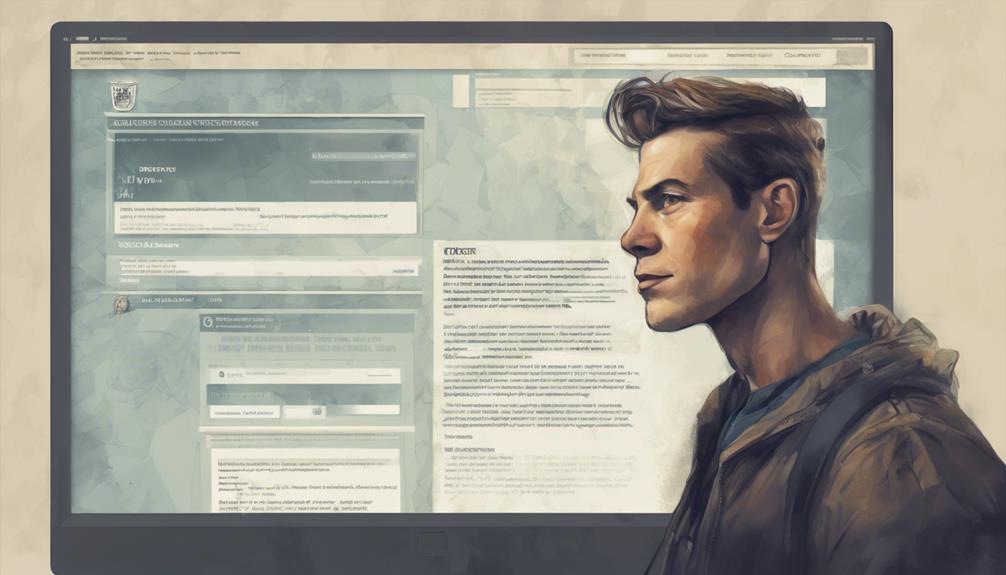
Free background check websites may offer convenience, but their reliability is often compromised by limited sources and lack of human verification, raising concerns about the accuracy of the information provided. While these platforms can be useful for basic background checks, users should approach the results with caution due to the potential for inaccuracies stemming from unreliable sources and automated searches. It is important to understand the limitations of free background checks before relying solely on them for critical decisions. Explore further insights to make informed choices regarding background screening.
Key Takeaways
- Free background check websites lack reliability due to limited sources.
- Inaccuracies can result from lack of human verification and oversight.
- Legal compliance standards may not be met, posing risks for users.
- Users may face legal consequences from unreliable data.
- Automated searches without supervision impact data validity.
Reliability of Free Background Checks
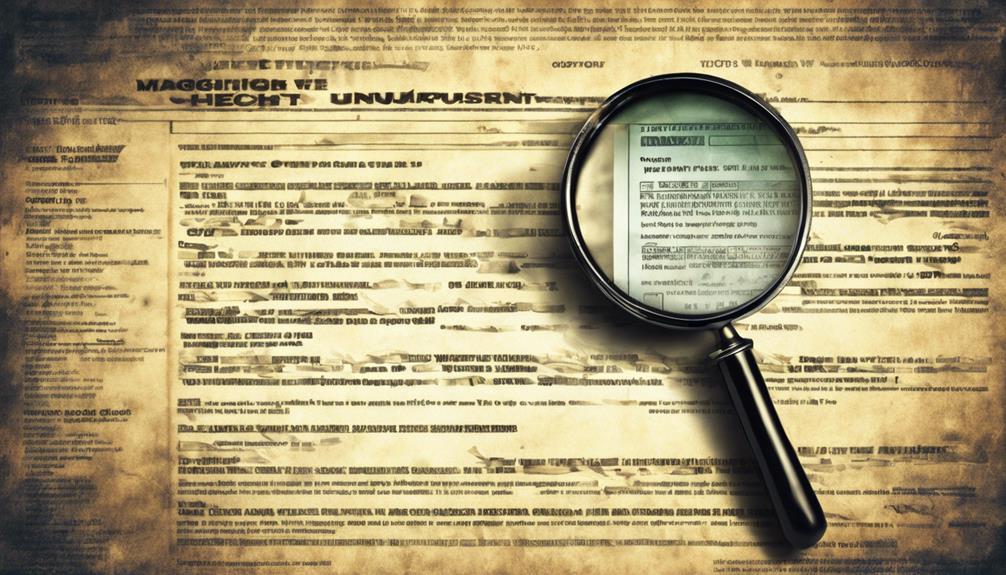
Free background checks may lack reliability, posing concerns about the accuracy of the information provided. While free online background checks offer a convenient way to access certain information like criminal records, their reliability is often questioned due to limited sources and the lack of human verification. These free checks may not always be sourced from a reliable source, leading to potential inaccuracies. Automated searches without human oversight can further impact the accuracy of the results, as there's no assurance of the data's validity.
Moreover, the absence of thorough vetting processes in free background checks raises doubts about their reliability. The focus on providing information quickly and at no cost may compromise the accuracy of the results, potentially leading to incomplete or outdated information.
Additionally, the legal compliance of these free checks is a concern, as their limitations may not meet privacy standards or other legal requirements, posing further risks to individuals utilizing such services.
Risks Associated With Free Checks
Limited sources of information in background checks that are free pose inherent risks for users. Free background checks often rely on automated searches that lack human examination, impacting the accuracy of the results. This can lead to incomplete or inaccurate information being provided to users, potentially causing them to make decisions based on unreliable data.
Additionally, free background checks may not always adhere to legal compliance standards, exposing users to potential legal consequences.
Unreliable information: Due to the lack of verification and vetting processes, information obtained from free background checks may not be trustworthy.
Accountability issues: Users face challenges in holding free background check websites accountable for any errors or omissions in the provided information.
Potential legal consequences: Relying on incomplete or inaccurate data from free background checks can result in legal issues for users, emphasizing the importance of utilizing reliable sources for background checks.
Best Free Background Check Websites

The top free background check websites in 2024, including TruthFinder, BeenVerified, Intelius, Information.com, and Instant Checkmate, offer extensive reports on individuals' criminal records and financial history. These websites are known for their reliability and accuracy, making them valuable for various purposes such as pre-employment screening and personal protection.
Users can access detailed reviews and comparisons of these platforms to make informed decisions based on their specific needs. These free background check websites play an important role in providing essential information for individuals and organizations looking to conduct thorough background checks efficiently and effectively.
With their commitment to delivering accurate and reliable results, these platforms have become go-to resources for those seeking detailed and trustworthy information on individuals' backgrounds.
Legal Considerations for Free Checks
How important are legal considerations when utilizing background check services offered for free?
When it comes to free background checks, legal compliance is essential to avoid potential legal issues and liabilities.
Here are some key legal considerations to keep in mind:
- Consent: It's vital to obtain consent from individuals before conducting a background check, even if the service is free.
- Fair Credit Reporting Act (FCRA): Free background checks may not always comply with the FCRA, which sets guidelines for how background checks should be conducted.
- Ethical Screening Process: Using free background check websites without legal compliance can raise ethical concerns. Employers should guarantee a lawful and ethical screening process to make informed hiring decisions.
Employers should be cautious and guarantee that any background checks conducted, even through free services, adhere to legal regulations to maintain a fair and lawful hiring process.
Community Insights on Background Checks

Community members actively engage in discussions about the importance of detailed background checks for maintaining safety and quality in various industries.
Office administrators stress the importance of confidentiality in background checks to preserve trust and privacy within the workplace.
Recruiters emphasize the need to carefully choose online background check services for thorough vetting of potential candidates.
Staffing services prioritize conducting thorough background checks to uphold safety and quality standards in their hiring processes.
Distribution centers aim to enhance their background check procedures to minimize risks and ensure a secure work environment for employees.
In the field of staffing services, detailed background checks are considered essential to make informed hiring decisions and mitigate potential risks in the recruitment process.
Community insights highlight the vital role of reliable background checks, especially when dealing with public data for criminal background checks or employment backgrounds, underscoring the necessity for accurate and thorough vetting processes.
Frequently Asked Questions
Are Free Background Checks Legit?
Free background checks may lack reliability due to limited sources and human verification. Incomplete information, accuracy issues, and legal compliance risks are common. Lack of expertise can lead to unreliable reports, posing potential legal problems.
What Is the Most Accurate Background Check Website?
When seeking the most accurate background check website, users can rely on platforms like TruthFinder, known for a 95% accuracy rate. Its advanced algorithms and vast data sources guarantee reliable information, aiding in informed decisions.
How Reliable Are Online Background Checks?
Online background checks vary in reliability based on data sources. Paid services tend to offer more accurate information. Reliable checks are essential for informed decisions in employment and personal life. Accuracy depends on data collection methods and reporting precision.
How Do I Know if a Background Check Is Legit?
To validate a background check's legitimacy, individuals should ensure it complies with laws like the FCRA, prioritizes ethical use of data, and maintains transparency in data handling. Verifying professional affiliations and updated information supports reliability.
Can I Trust the Accuracy of Free Background Check Websites?
When it comes to free background check websites, many people question the reliability of the information provided. While some may offer accurate results, it’s essential to be cautious and verify the authenticity of the data. For truly reliable real background checks, it’s often best to use a paid, professional service.
Conclusion
To sum up, while free background check websites can be a convenient resource, their reliability may be questionable. According to a recent survey, only 30% of users found the information provided by free background checks to be accurate.
It's important for individuals to weigh the risks and legal considerations before relying solely on these services for important decisions.
Background Checks
Do Charges Appear on Background Checks?
Yes, charges can appear on background checks, potentially affecting job prospects and legal standing.
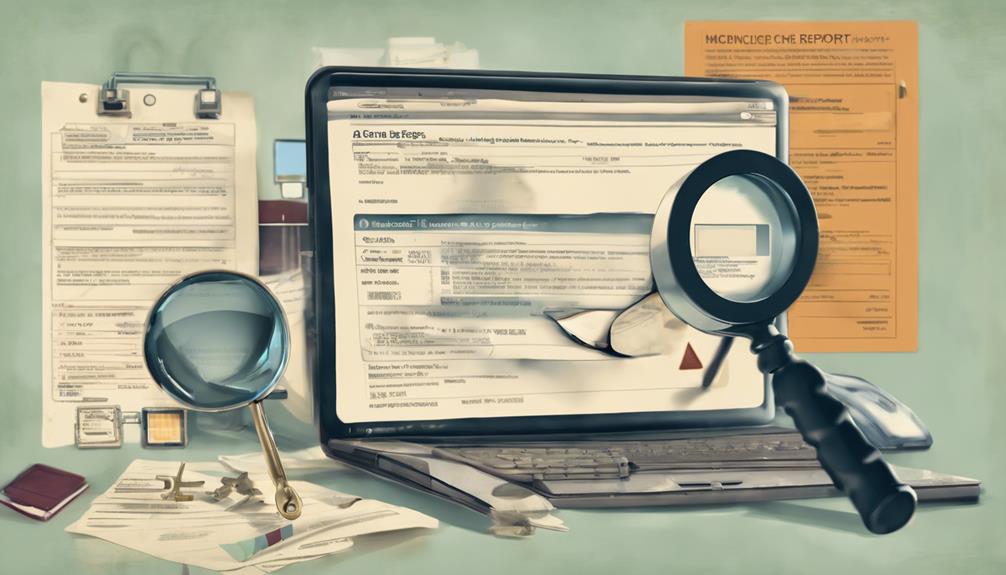
Yes, charges, whether convictions, pending cases, or warrants, can show up on background checks. These findings can impact job opportunities and legal matters for individuals.
Key Takeaways
- Charges such as arrests, convictions, and pending cases can appear on background checks.
- Types of charges, including misdemeanors and felonies, may impact background check results.
- DWI charges can affect background checks and employment opportunities.
- Pending charges are visible on background checks and can influence hiring decisions.
- Awareness of expunction and nondisclosure options can mitigate the impact of charges on background checks.
Types of Charges on Background Checks

Background checks can uncover a range of charges, such as criminal convictions, pending cases, and warrants. When it comes to types of criminal charges that may appear on background checks, individuals should be aware of the potential implications. These checks can reveal a variety of offenses, including misdemeanor charges like theft, vandalism, or drug possession, which are considered less severe than felonies.
Felony charges, on the other hand, involve more serious crimes such as assault, murder, or fraud and can have a significant impact on one's record.
Moreover, background checks may also show pending criminal charges, indicating ongoing legal proceedings against an individual. Arrest records might be included in these checks, reflecting instances where a person was taken into custody by law enforcement.
Understanding the types of criminal charges that can surface on a background check is vital for individuals seeking employment, as this information can greatly influence potential job opportunities.
Impact of DWI Charges on Records
How do DWI charges in Texas affect individuals' records on background checks?
DWI charges in Texas can have a long-lasting impact on one's record when it comes to background checks. These charges, whether dismissed, resulted in a conviction, or are pending, can appear on background checks indefinitely, potentially affecting employment opportunities.
However, there are options for individuals facing DWI charges to mitigate the impact on their records. For instance, dismissed DWI charges without probation may be eligible for deletion through expunction. Additionally, in specific circumstances, DWI convictions can be sealed with an order of nondisclosure.
It's essential for individuals with DWI charges to be aware that these records can be visible to potential employers during background checks. Understanding the options available, such as expunction and nondisclosure, can help individuals navigate the implications of DWI charges on their records in Texas.
Visibility of Pending Charges
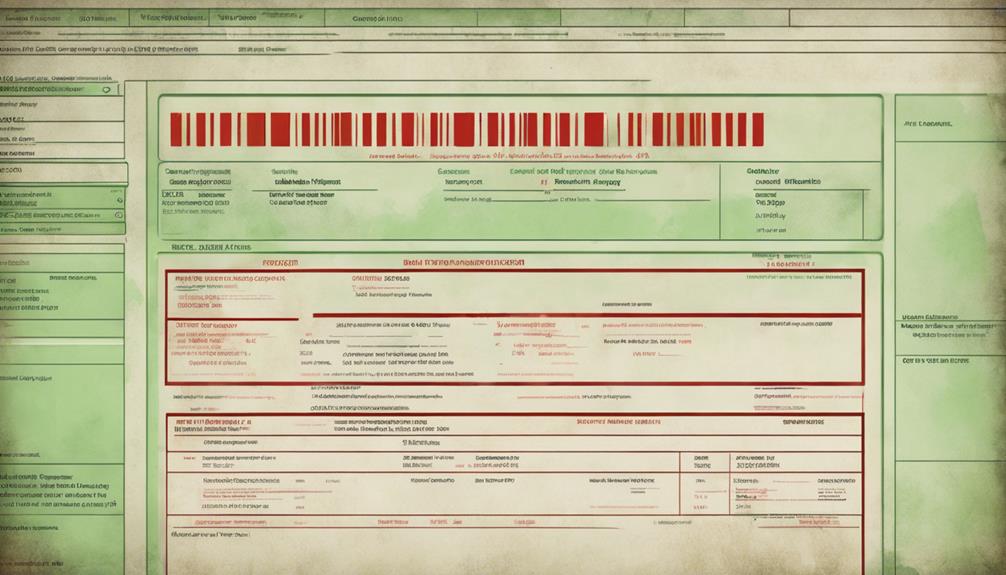
Pending charges commonly appear on employment background checks, providing insight into ongoing legal matters for candidates.
In Texas, background checks may show pending charges as part of an individual's criminal record. The visibility of pending charges can vary depending on state laws and the specific approach taken by the employer or background check provider.
When considering candidates with pending charges, employers must carefully assess the relevance of these charges to the job position and the company's policies. It's vital for candidates to be transparent about any pending charges and be prepared to discuss them during the hiring process.
Employers should handle the presence of pending charges on background checks with sensitivity and in accordance with legal guidelines. Discriminatory practices based on pending charges should be avoided, and decisions should be made based on legitimate job-related reasons.
Employment Screening Laws
Employment screening laws, including the Fair Credit Reporting Act (FCRA), set guidelines for the use of background checks in making hiring decisions. These laws aim to guarantee that background checks are conducted fairly and in compliance with regulations.
The Equal Employment Opportunity Commission (EEOC) enforces Title VII of the Civil Rights Act, which prohibits discrimination based on criminal records revealed in background checks. State laws also play an essential role, as they may dictate what information can be reported in background checks, highlighting the importance of adherence to specific state regulations.
To maintain legal compliance, employers are required to obtain written consent from candidates before conducting background checks. Additionally, individuals have the right to challenge and correct any inaccurate information found in their background checks under employment screening laws.
Components of Background Checks
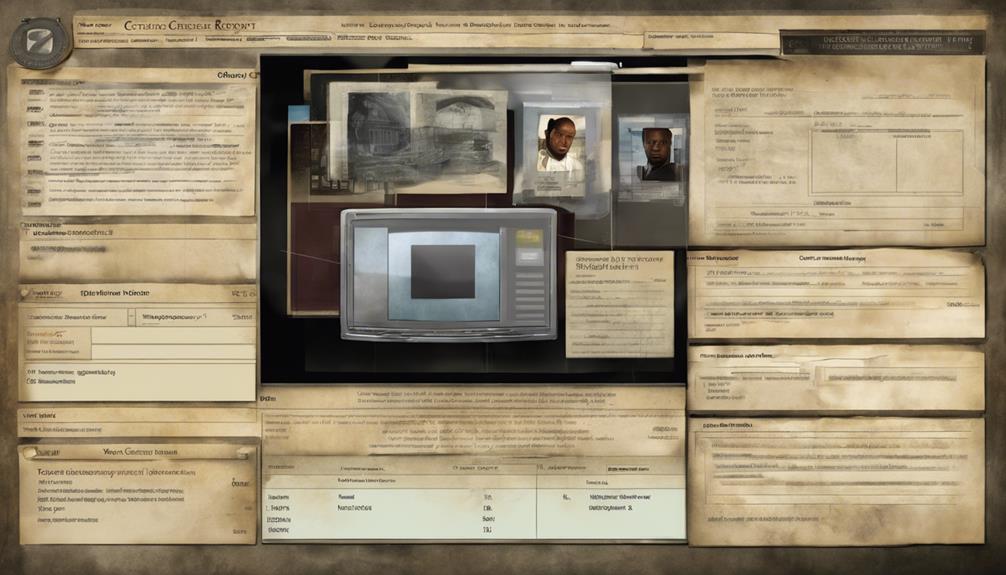
Background checks encompass a range of essential components like arrest record visibility, the expunction process overview, and prospective employer awareness. These elements play a pivotal role in providing a thorough assessment of an individual's background.
Understanding how these components interplay is important for ensuring accurate and informed decision-making in the hiring process.
Arrest Record Visibility
Arrest records, detailing past legal involvement, are a crucial part of background checks, offering a detailed overview of an individual's criminal history.
Employers may access arrest records, including charges that were filed, even if they were later dismissed.
Background checks cover arrests, convictions, court records, and warrants, presenting a thorough picture of an individual's criminal background.
The visibility of arrest records on background checks can greatly impact employment opportunities, as employers consider a candidate's legal history.
Understanding the components of background checks, such as arrest record visibility, enables individuals to anticipate what information potential employers might discover.
Given the impact arrest records can have on employment prospects, individuals should be aware of what these records entail and how they might be perceived by those conducting background checks.
Being informed about the inclusion of arrest records in background checks allows individuals to prepare adequately and address any concerns employers may have regarding their past legal involvement.
Expunction Process Overview
Considering the importance of expunction in clearing one's criminal history from background checks, understanding the procedural overview of this process is vital for individuals seeking to move forward with a clean record.
The expunction process typically involves filing a petition through a criminal defense lawyer and obtaining a judge's approval. This legal remedy allows for the removal of past arrests from public record, including dismissed charges. Once expunction is granted, individuals can legally deny any past arrests that have been expunged on job applications.
Expunction plays a pivotal role in clearing one's criminal history from public databases and background checks, providing a fresh start by eliminating dismissed charges. By following the necessary steps and seeking the assistance of a criminal defense lawyer, individuals can navigate the expunction process effectively to make sure that their past arrests don't appear on future background checks.
Prospective Employer Awareness
When employers conduct background checks, they have visibility into various aspects of an individual's history, including arrest records and other pertinent details. Prospective employers are privy to a range of information that can influence their hiring decisions.
Here are some key points regarding prospective employer awareness in background checks:
- Charges: Employers can see both pending and past charges on a background check, even if the charges were ultimately dismissed.
- Background Checks: These screenings encompass criminal history details such as arrests, convictions, and court records.
- Court Records: Information from court records plays a vital role in background checks, providing insight into legal matters related to the individual.
- Consideration: Prospective employers often evaluate the nature of charges and their significance to the job when examining background check results.
Being aware of what prospective employers can access in a background check allows individuals to prepare and address any concerns that may arise during the hiring process.
Handling Pending Charges in Texas
Employers in Texas must consider pending charges when evaluating candidates during background checks.
Pending charges are part of a candidate's criminal record and can influence hiring decisions.
It's essential for employers to carefully assess the visibility and potential impact of pending charges on their evaluation criteria.
Pending Charge Visibility
Regularly, pending charges in Texas background checks must be thoroughly assessed to guarantee compliance with legal requirements and make informed hiring decisions. When handling pending charges in background checks, employers should consider the following:
- Understanding of Pending Charges: Pending charges refer to prosecutor-filed charges awaiting resolution in court, without a plea agreement or trial outcome yet.
- Visibility Factors: The visibility of pending charges on background checks varies based on state laws, search type, and the severity of the charge.
- Employer Responsibilities: Employers must verify the accuracy of criminal record information, assess pending charges in the context of the job, and adhere to EEOC guidance to prevent discrimination.
- Legal Compliance: Ensuring legal compliance when dealing with pending charges is essential for making well-informed hiring decisions. Consultation with legal experts can aid employers in managing this process effectively.
Employer Evaluation Criteria
Understanding how employers in Texas evaluate pending charges involves considering various factors such as relevance to the job, recency, severity, and potential impact on workplace safety. Employers evaluate pending charges based on the nature of the offense, job responsibilities, time elapsed since the charge, and the candidate's explanation.
They may also consider industry standards, legal requirements, company policies, and potential risks associated with the charges. Candidates should be prepared to provide context, updates on the case status, and demonstrate positive changes or rehabilitation efforts.
It's essential for employers to handle pending charges ethically, fairly, and in compliance with federal and state laws to avoid discrimination or legal repercussions. By adhering to proper employer evaluation criteria, companies in Texas can make informed decisions when assessing candidates with pending charges, ensuring a fair and lawful hiring process.
Understanding Criminal Charges
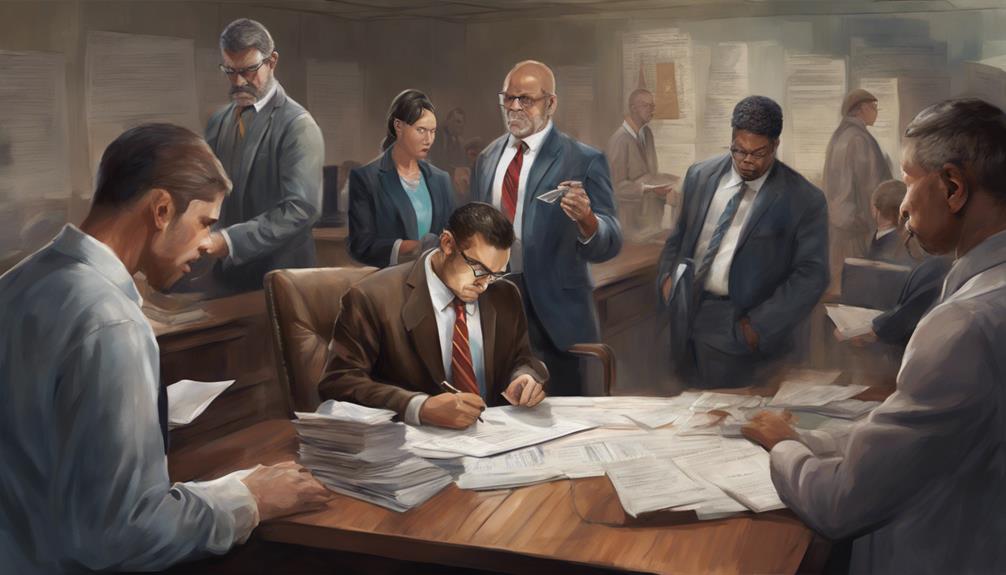
Criminal charges on background checks can have significant implications for individuals seeking employment opportunities. Understanding the nuances of how criminal charges are reflected in background checks is essential for job seekers.
Here are some key points to take into account:
- Types of Charges: Background checks may reveal various kinds of criminal charges, including arrests, convictions, and pending charges.
- Pending Criminal Charges: Background checks might show pending criminal charges that are still unresolved, which could impact a candidate's job prospects.
- Dismissed Charges: Even if charges were dismissed, they might still appear on a background check if they weren't expunged from the individual's record.
- Significance for Job Seekers: Job seekers should be aware of how criminal charges can impact their chances of securing employment and be prepared to address any concerns that potential employers may have regarding their background.
Employer Considerations on Charges
Employers evaluating candidates for job positions often take into account the nature and severity of any charges revealed during background checks. Pending charges, although not convictions, can influence hiring decisions. Employers must adhere to Equal Employment Opportunity Commission (EEOC) guidelines to ensure fair treatment of candidates with pending charges. It is essential for candidates with pending charges to be prepared to provide context and explanations to potential employers. Before making a hiring decision, employers may assess the relevance of pending charges to the job position. This consideration is crucial in determining whether the charges pose a risk or conflict with the responsibilities of the role.
| Employer Considerations on Charges | |
|---|---|
| Pending Charges | Hiring Decisions |
| Nature and Severity | Relevance to Position |
| EEOC Guidelines | Context from Candidates |
Legal Remedies for Background Check Results
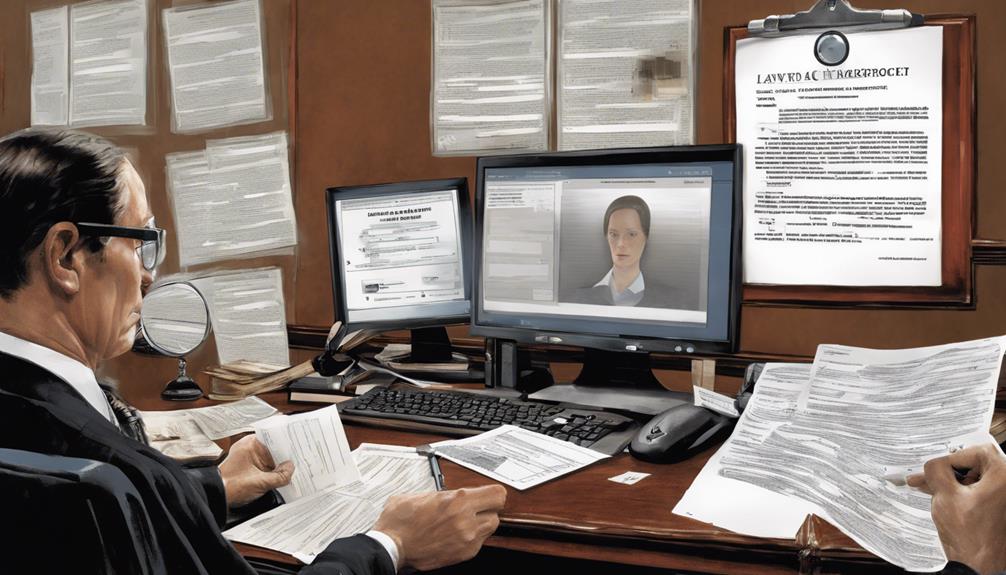
Seeking legal remedies such as expunction offers individuals the opportunity to remove dismissed charges from public record, thereby preventing them from appearing on background checks in Texas.
When considering legal actions for background check results, individuals should be aware of the following:
- Expunction Benefits: Expunction allows for the complete removal of dismissed charges from public databases, ensuring they don't show up on background checks.
- Legal Process: The expunction process involves filing a petition, attending a court hearing, and obtaining a judge's approval before the records can be cleared.
- Impact on Job Applications: After expunction is granted for dismissed charges, individuals can legally deny any past arrests on job applications.
- Clean Slate: Expunction provides individuals with a clean criminal record by making expunged records inaccessible to potential employers conducting background checks.
Frequently Asked Questions
Do Pending Charges Show up on Background Checks in Texas?
Pending charges in Texas will generally appear on background checks conducted by employers. Employers might view pending criminal charges as part of a candidate's criminal history, potentially impacting employment decisions. Handling pending charges carefully is essential to avoid issues.
Do Pending Charges Show up on a Background Check in Michigan?
In Michigan, do pending charges reflect on background checks? Employers may see pending charges depending on the check type and charge severity. Candidates can dispute inaccuracies and explain to potential employers, ensuring fair assessment.
Do Pending Charges Show up on a Background Check in Ny?
Pending charges in New York can show up on background checks, allowing employers to access ongoing legal proceedings. Candidates should address these charges proactively to provide context. Employers may consider pending charges when evaluating suitability for a position.
What Does a Background Check Show in Texas?
In Texas, background checks reveal criminal records, including arrests and court outcomes. Employers can access pending charges info. Education, employment, and credit history may also be included. Knowing this helps candidates prepare for job screenings.
Can Misdemeanors Affect the Outcome of a Background Check?
Yes, misdemeanors on background checks can affect the outcome. Employers often consider the nature and severity of the offense, how long ago it occurred, and how it relates to the job. Some companies may exclude candidates with certain misdemeanors, while others may be more lenient.
Conclusion
To wrap up, charges certainly do appear on background checks! It's like shining a spotlight on a person's past, revealing every misstep and mistake they've made.
So, it's important to address any pending charges head-on and be prepared to explain them to potential employers. Remember, the truth always comes to light, whether you like it or not.
Background Checks
Background Checks Companies in India: Top Picks
Curious about top background check companies in India? Catch a glimpse of Proquest Consulting's cutting-edge AI solutions and expert verifications.

In India, Proquest Consulting shines as a top pick for background checks, employing AI and skilled teams for meticulous verifications. With a track record of screening over 1 lac candidates and spotting 3k discrepancies, they offer dedicated software and personalized support. Their focus on detailed background checks sets high standards in the HR industry. If you're looking for reliable verification services, Proquest Consulting's commitment to privacy and expertise in vetting new hires make them a preferred choice.
Key Takeaways
- Utilizes machine learning for extensive background checks
- Screened over 1 lac candidates and identified 3k discrepancies
- Offers dedicated software and personalized manager support
- Specializes in employee vetting for new hires and senior roles
- Trusted for thorough background screening services
Top Background Verification Companies

Proquest Consulting leads the list of top background verification companies in India. With a reputation for being a trusted partner, ProquestCS stands out as an Indian-based background verification company offering all-encompassing screening solutions.
Their expertise in employee background verification is coupled with cutting-edge technologies like AI and Machine Learning, ensuring global background screening standards are met. ProquestCS boasts a skilled team that has successfully screened over 1 lac candidates, uncovering 3k discrepancies, showcasing their commitment to thorough background checks.
Companies rely on ProquestCS for their meticulous approach to screening, providing peace of mind in the hiring process. By offering dedicated software and personalized managerial support, ProquestCS aims to streamline the verification process, making them a go-to choice for businesses looking for reliable and efficient background screening services.
Leading HR Verification Services
Leading the way in HR verification services is Proquest Consulting, a top-ranked background verification company in India with over a decade of experience. Proquest Consulting has established itself as a global leader in background screening solutions, specializing in detailed background verification for employment purposes.
Utilizing advanced technologies like AI and Machine Learning, Proquest Consulting offers professional background checks, including education and employment verification, to assist companies in making informed hiring decisions.
With a track record of identifying 3,000 discrepancies in their verification processes and screening over 100,000 candidates, Proquest Consulting has built a reputation as one of the most trusted background verification companies in India. Their specialized team, dedicated software, and assigned manager for seamless processes have made them a go-to choice for numerous companies seeking thorough and reliable background checks.
Proquest Consulting's commitment to excellence has set a high standard in the industry for effective HR verification services.
Trusted Background Check Providers

A key aspect of trustworthy hiring decisions lies in partnering with reputable background check providers in India. When it comes to trusted background verification companies in the country, Proquest Consulting stands out with over a decade of industry experience.
Having screened more than 1 lac candidates and uncovered 3k discrepancies, ProquestCS offers a thorough range of services including employee screening for various corporate sectors. Their specialization in vetting new hires and senior-level positions ensures a detailed background verification process that includes employment verification and criminal background checks.
ProquestCS is known for its commitment to data privacy and provides dedicated software along with a dedicated manager as a single point of contact, streamlining the hiring process for their clients. Many companies rely on ProquestCS for their reliable and precise background screening services.
Reliable Verification Firms
When seeking reliable verification firms for background checks in India, companies look for established providers with a proven track record of accuracy and efficiency.
Proquest Consulting stands out as one of the best background verification companies in the country, boasting over a decade of experience in the industry. With a focus on thorough background check services, ProquestCS utilizes AI and Machine Learning technologies to offer a wide range of screening solutions.
Their global background verification company has screened over 1 lac candidates, identifying 3k discrepancies, and providing trusted background check services to various corporate sectors. ProquestCS not only offers reputable background verification services but also specializes in employee background screening services, ensuring meticulous checks on criminal, educational, and credit histories.
Clients benefit from their dedicated software and assigned manager for a seamless experience, making them a top choice for companies looking to build skilled and reliable long-term teams.
Top Picks for Background Checks

Proquest Consulting emerges as a top contender among the best picks for conducting thorough background checks in India.
As a leading Indian background verification company, ProquestCS leverages machine learning algorithms to offer extensive background verification checks, including criminal record checks, employment verification, and more.
With a track record of screening over 1 lac candidates and spotting 3k discrepancies, ProquestCS stands out for its commitment to accuracy and reliability.
Their dedicated software, personalized manager support, and extensive database coverage guarantee swift turnaround times and seamless integration into the recruitment process.
Trusted by numerous companies across various industries, ProquestCS focuses on creating strong, skilled teams for their clients, making them a preferred choice for background screening and verification services in India.
For those seeking the best background check services, Proquest Consulting is a top recommendation with a proven reputation for excellence.
Frequently Asked Questions
What Is the Most Popular Background Check Company?
The most popular background check company is HireRight. They serve over 240 countries worldwide and provide a full range of background check services. Many industries trust HireRight for their reliable and thorough background verification needs.
Which Company Has Strict Background Verification in India?
In India, Proquest Consulting stands out for its rigorous background verification process. With over 3k discrepancies identified, their attention to detail shines. Trusted by many, their specialized team guarantees thorough screening across various sectors.
What Background Check Do Employers Use in India?
Employers in India utilize background checks to verify education, employment history, criminal records, identity, and references of potential candidates. These checks are essential for ensuring credibility, reliability, and integrity in the Indian workforce, aiding informed hiring decisions.
What Is the Highest Level Background Check?
The highest level background check involves thorough examination of an individual's criminal, financial, educational, and professional history. It includes scrutiny of international records, credit history, and reference checks, essential for positions of high trust and responsibility.
Can Tabb Background Checks be Considered as one of the Top Picks for Background Check Companies in India?
When considering background check companies in India, the reliability of Tabb background checks makes it a top pick for many. With its comprehensive screening services and efficient processes, Tabb has gained a reputation for delivering accurate and thorough results, making it a trusted choice for businesses and individuals alike.
Conclusion
To sum up, when it comes to background checks in India, these top picks for verification companies are the go-to choice for reliable and trusted services.
Did you know that according to a survey by NASSCOM, over 70% of Indian companies conduct background checks on potential employees before hiring them?
This statistic highlights the importance of thorough verification processes in today's competitive job market.
-
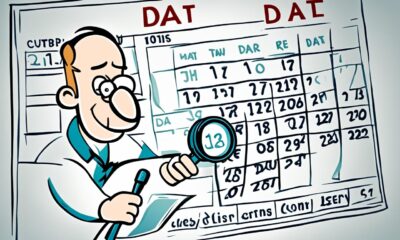
 Background Checks4 months ago
Background Checks4 months agoFind Someone Fast: People Search by Birthday
-

 Background Checks4 months ago
Background Checks4 months agoThe Truth About Cyber Background Checks: What You Need to Know
-

 Arrest Warrants4 months ago
Arrest Warrants4 months agoMissouri Arrest Warrants: How to Find Them
-

 Arrest Warrants4 months ago
Arrest Warrants4 months agoWarrants for Arrest in NY: Search and Information
-

 Background Checks4 months ago
Background Checks4 months agoNew Law on Background Checks in Texas: What Has Changed
-

 Arrest Warrants4 months ago
Arrest Warrants4 months agoSearch Arrest Warrants: A Complete Guide
-

 Arrest Warrants4 months ago
Arrest Warrants4 months agoActive Arrest Warrants – Why You Should Care About Them
-

 Arrest Warrants4 months ago
Arrest Warrants4 months agoVirginia Arrest Warrants: How to Look Them Up













